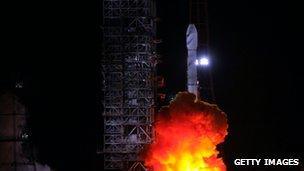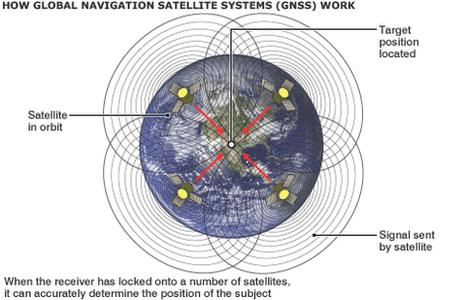China launches two more Beidou navigation satellites
- Published

China plans to launch 35 navigation satellites
China has moved a step closer to completing its own navigation and positioning satellite network with the launch of two more navigation satellites.
It brings the Beidou system, which became operational with coverage of China last December, to 13 satellites.
To have global coverage, the country eventually aims to have 35 satellites in orbit by 2020.
China hopes that Beidou will wean it off the US Global Positioning System.
Just like GPS, the Chinese system is designed to let users determine their positions to within a few meters.
Beidou, also known as Compass, has been developed for both military and civilian uses.
The two satellites went up on Monday morning from the Xichang Satellite Launch Centre in southwest Sichuan province.
They were carried on a Long March-3B rocket, according to the state-run Xinhua news agency.
"The two satellites will help improve the accuracy of the Beidou, or Compass system," Xichang Satellite Launch Centre said in a statement carried by the agency.

Now partially operational, Beidou makes China only the third country in the world, after the US and Russia, to have its own navigation system.
Russia's Glonass satellite network has 31 satellites in orbit, but only 24 of them are operational. Four more are in reserve, one undergoing trials, and two under maintenance.
According to the Russian Space Agency, Roscosmos, Russia plans to spend $694m (£427m) on its Glonass system this year.
At a recent annual Satellite Navigation Forum in Moscow, Russia's deputy prime minister Vladislav Surkov said that more than 300 billion roubles (£6bn, $10.2bn) have been budgeted to further develop Glonass and bring 30 satellites into operation by 2020.
Europe has also been building a navigation system, called Galileo, which has two satellites in orbit, launched in October last year. The next two are scheduled to follow later this year.
The space project of the European Commission, the EU's executive arm, plans to have all 26 Galileo satellites in orbit by the end of 2015.
- Published19 April 2012
- Published18 January 2012
- Published8 March 2012